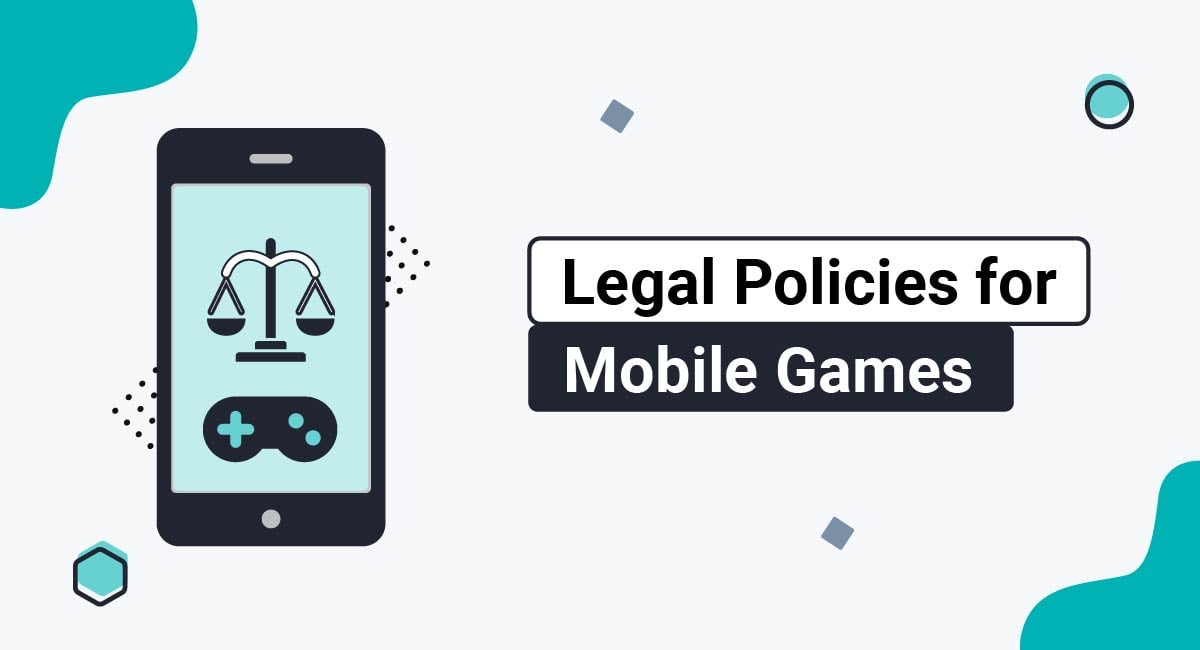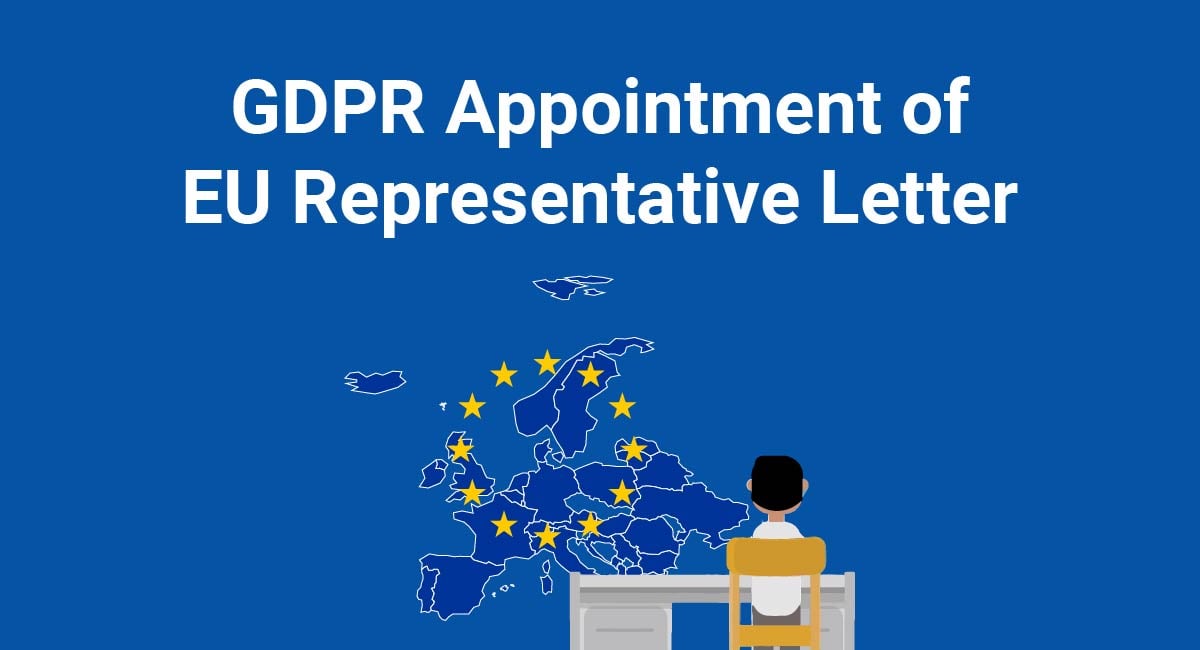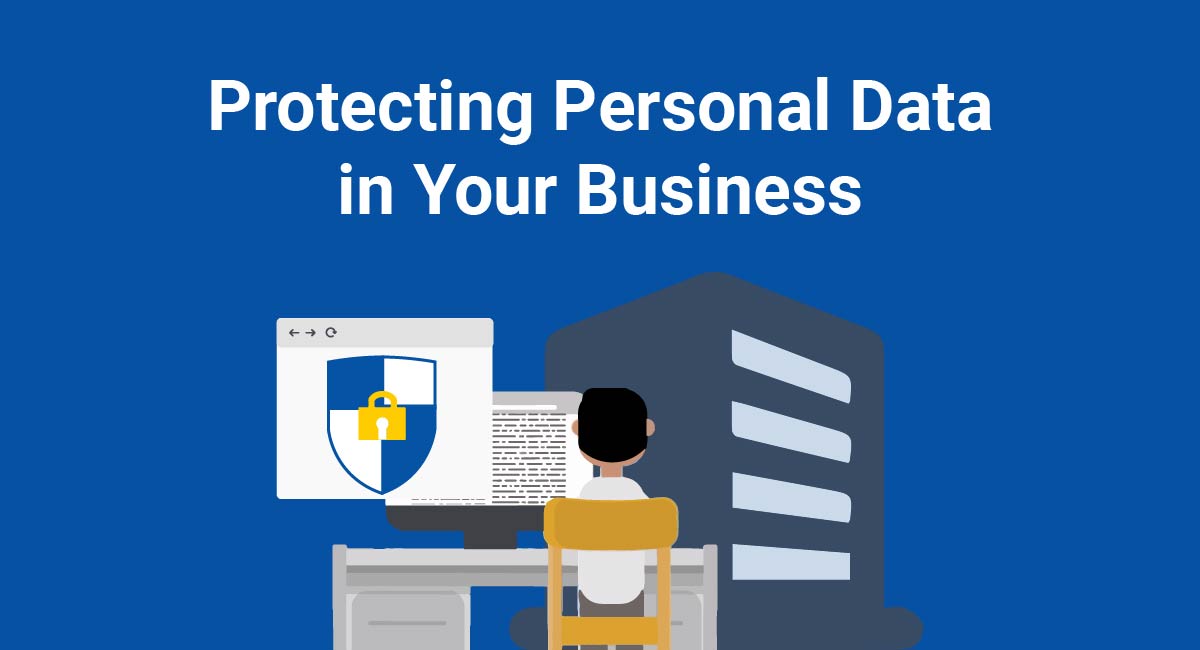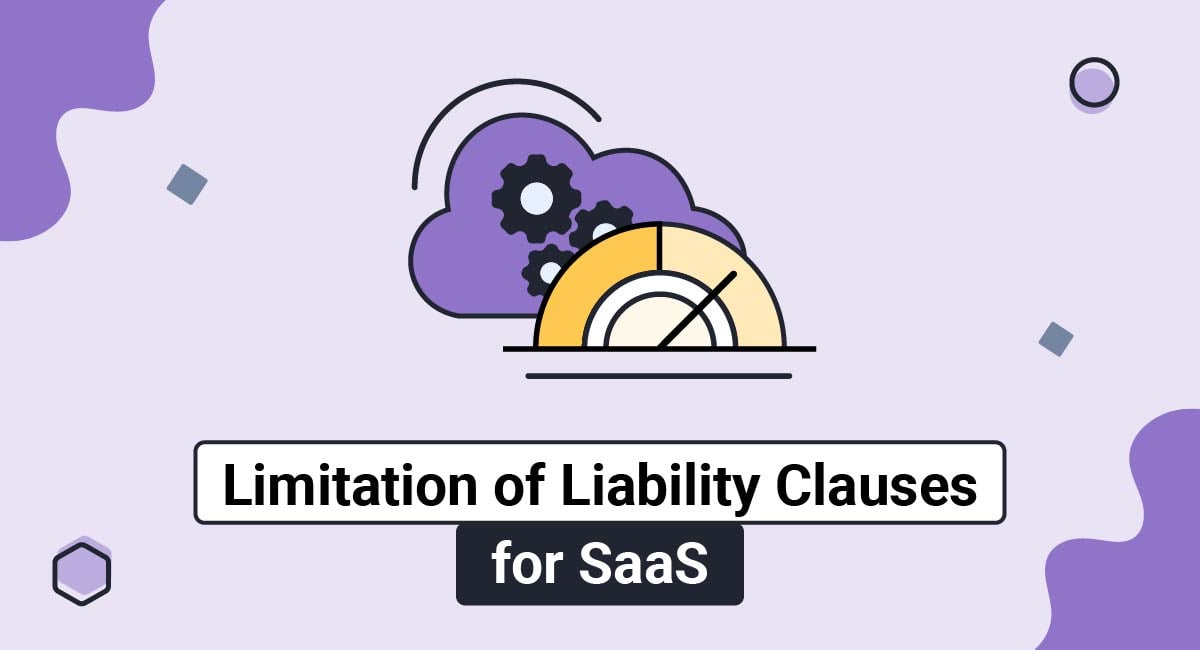When you make a mobile game public for users to play, you'll need to comply with legal obligations such as privacy laws. You'll also need to let your users know how they are allowed to use your game, and what uses of the software itself are permitted.
This can be done through legal documents including a Privacy Policy, Terms and Conditions, and an End User License Agreement (EULA). These documents will also make sure that your software is protected from misuse and can help make sure mobile game users are aware of the conditions for using your game.
This article will explain the legal policies you'll need to have for your mobile games and how to create and display them.
TermsFeed is the world's leading generator of legal agreements for websites and apps. With TermsFeed, you can generate:
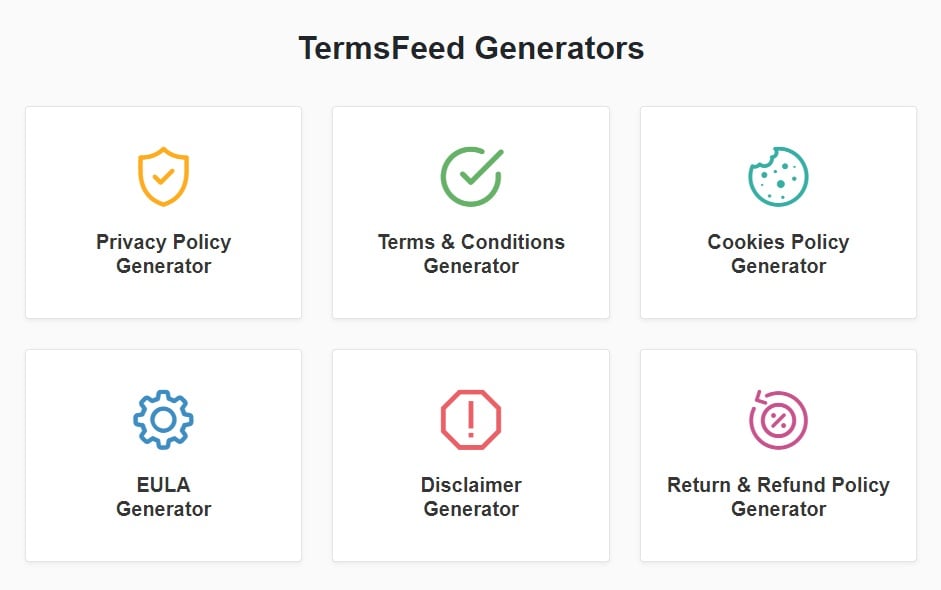
- 1. General Compliance Requirements for Mobile Games
- 1.1. Legal Requirements
- 1.2. App Store Requirements
- 2. Privacy Policy for Mobile Games
- 2.1. Why Do You Need a Privacy Policy for Mobile Games?
- 2.2. What to Include in Privacy Policy for Mobile Games
- 2.3. How to Display a Privacy Policy for Mobile Games
- 3. Terms and Conditions for Mobile Games
- 3.1. Why Do You Need Terms and Conditions for Mobile Games?
- 3.2. What to Include in Terms and Conditions for Mobile Games
- 3.3. How to Display Terms and Conditions for Mobile Games
- 4. EULA for Mobile Games
- 4.1. Why Do You Need an EULA for Mobile Games?
- 4.2. What to Include in an EULA for Mobile Games
- 4.3. How to Display an EULA for Mobile Games
- 5. Summary
General Compliance Requirements for Mobile Games
For a mobile game, most of your legal obligations are relating to privacy>. You will also have to comply with specific rules relating to children's data if your game is designed for children, or may have children who use it.
In addition, app stores like the Google Play Store and the Apple App Store have requirements for your game to be listed on their platforms.
Let's take a look at each of these.
Legal Requirements
The main legal requirements for mobile games are because of privacy laws.
Most privacy laws around the world require you to tell your users you are collecting their data. These laws include the General Data Protection Regulation (GDPR) in the EU, the California Online Privacy Protection Act (CalOPPA) in the United States, the Privacy Act in Australia, the Data Protection Act in the UK, and more.
A well-drafted and visible Privacy Policy ensures that you meet this requirement.
Many countries also have special rules around protecting children's data. In the U.S., for example, the Children's Online Privacy Protection Act (COPPA) and the updated version of COPPA, known as COPPA 2.0, have special rules for websites, games or apps that are designed for children and teens.
For a mobile game, COPPA would require that you:
- Get appropriate consent from parents of children under 13, and consent from teens between 14-17
- Don't collect data without consent from anyone under 17
- Don't advertise to children or teens through your game
- Have an "Eraser Button" so that accounts can be easily deleted
Other than these legal rules, there are other requirements you need to follow before your mobile game is ready for players to use, such as app store requirements.
App Store Requirements
Mobile platforms such as the Apple App Store and Google Play Store may require you to have a Privacy Policy to list your mobile game on their platform.
For example, Google Play requires developers to meet the Play Console Requirements before they can submit an app, including a mobile game. One of the requirements is that you must "upload your app's privacy policy and fill out your Data safety section requirements."
The Apple App Store has a similar requirement, stating, "You'll need to provide information about your app's privacy practices, including the practices of third-party partners whose code you integrate into your app, in App Store Connect."
Having a Privacy Policy, Terms and Conditions, and EULA, and displaying them correctly in your mobile game interface, will ensure that you meet your legal requirements and obligations towards your users.
We'll take a look at each of those legal agreements now.
Privacy Policy for Mobile Games
A Privacy Policy is a document that covers how you collect, use, share and store user data. If you collect personal information from users of your mobile game, you'll need to have one of these. Privacy Policies for mobile games are in many cases very similar to other websites or mobile apps.
In this section, we'll go through:
- Why you need a Privacy Policy for a mobile game
- What you need to include in the Privacy Policy
- How to display the Privacy Policy
Let's take a look at each of these in more detail.
Why Do You Need a Privacy Policy for Mobile Games?
You need a Privacy Policy for mobile games because laws in many jurisdictions require you to provide one whenever you collect personal data on a user, as noted above.
To comply with these laws, you have to have a clearly visible, obvious, easy-to-understand document where users can understand their rights and what is being done with their data.
Personal data that you might collect for a mobile game includes information such as:
- Name
- Address
- Email address
- Username
- IP address
- Location
- Data on in-game purchases
- Advertising or marketing cookies
If you are collecting any of this (or similar) information on your mobile game users, you'll need a Privacy Policy.
What to Include in Privacy Policy for Mobile Games
For your Privacy Policy for a mobile game, you'll need clauses including what data you collect, what you use it for, who you share it with, any other jurisdictions you transfer it to, and users rights.
For a mobile game specifically, you'll also need clauses on, for example:
- Information collected during gameplay
- Deleting user account data
- Data relating to social interactions, such as in-game chat
If your game is designed for children, you'll also need to include sections that relate to children's data, and ensure that agreement to your policy is in line with COPPA and COPPA 2.0.
Let's take a look at a couple of example clauses from a Privacy Policy now.
First, here's an example from the Privacy Policy for the mobile version of the game Stardew Valley, explaining what data is collected during gameplay:
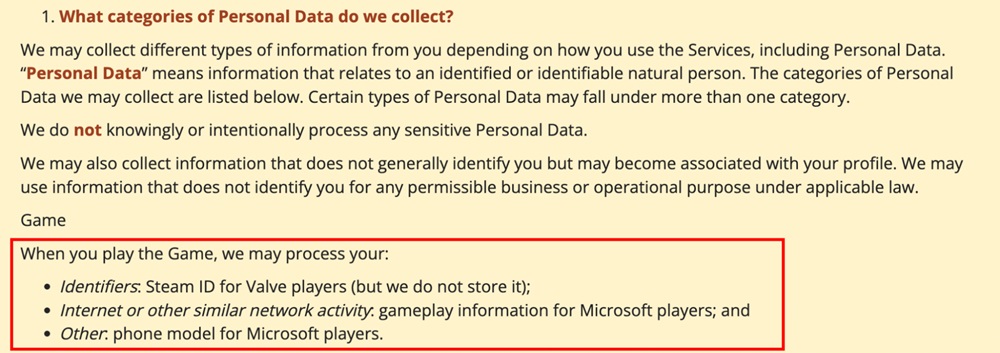
You can see that Stardew Valley collects information on gamer ID, internet and network activity, and phone model.
The Privacy Policy is written in a clear, easy-to-read way, utilizing lists and bold and different colored text, which is good practice for your Privacy Policy as well.
Here's another couple of examples from the Privacy Policy for the mobile version of Playerunknown's Battlegrounds (PUBG).
In the image below you can see some of its policies on data retention. It notes that storage of data will be "for the lifetime of your use of the Game," and in some cases longer if required by law:
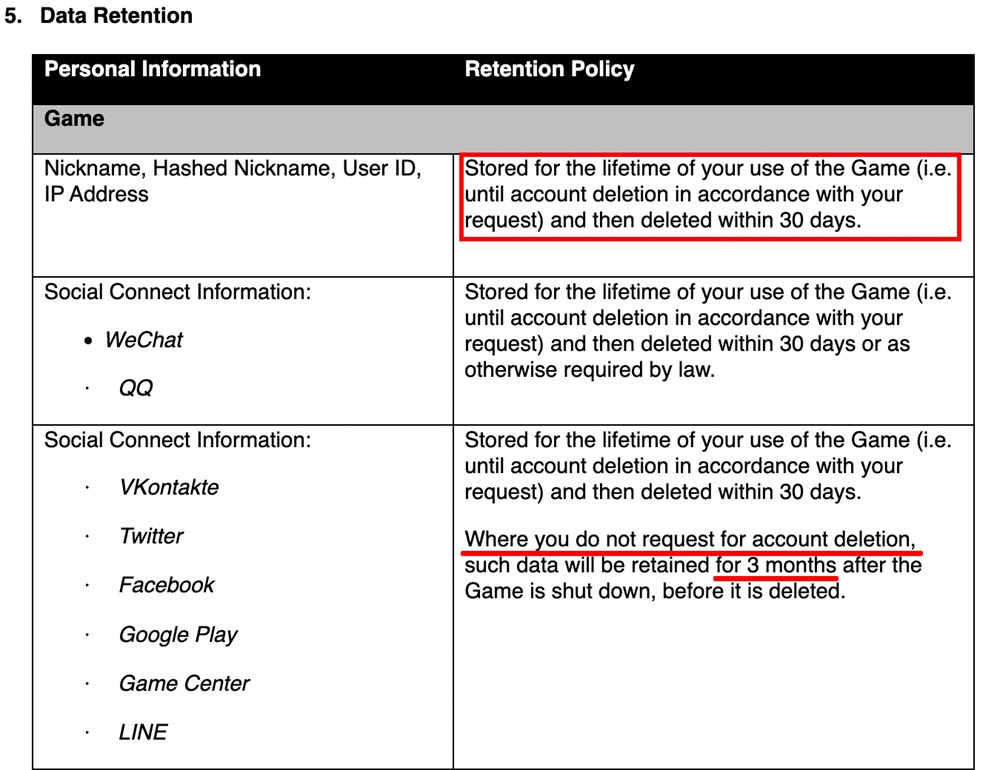
Another example from the same game relates to processing chat data, which is analyzed in PUBG to promote user safety. In its Privacy Policy, PUBG explains that data is collected for "legitimate interests" and analyzed for these reasons:

If you have a chat function in your game, you need to let your users know which chat data is collected and processed, and for which purposes. If you use moderation or monitoring of chat or forum content like PUBG, you should disclose this.
You can see that the clause also mentions compliance with the PUBG mobile End User License Agreement (EULA). We'll also discuss the EULA below and what this is used for.
How to Display a Privacy Policy for Mobile Games
To effectively display your Privacy Policy in a mobile game, you'll need to include it in a couple of different places, including your main website footer and within the game in a settings, legal, or similar type of menu.
You will also need to provide access to it via the app store for users to view before they download the game.
Here are a couple of examples of how this can look.
First, you can include a link to your Privacy Policy in a pop-up when the game opens, like this example from Block Blast:
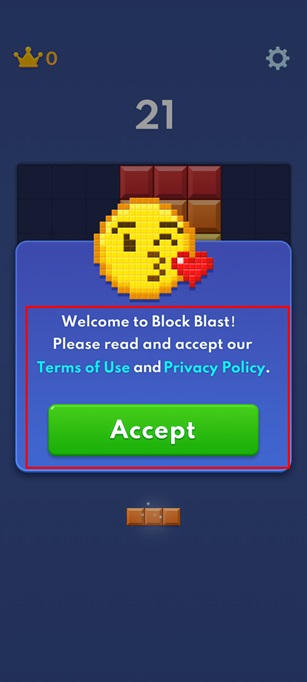
Here's another example, from Candy Crush:
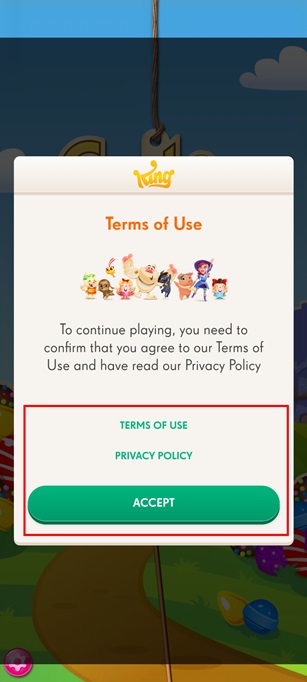
You can see in each example that there is a clear button to consent to or accept. This is the correct way for your users to be able to give an "affirmative" consent, to make sure that any agreement is legally valid and binding.
Second, you can also include a link to the Privacy Policy in the footer of your website for your mobile game, such as this example from Stardew Valley:

Here, note that the links to the Privacy Policy and Terms of Use are the same size as the other text. They are easily visible and readable. This is good practice for making sure your users can find the documents and agree to them easily.
Include a link to your policies within the game itself in an appropriate menu.
This could look something like this example, from Duolingo. Within the Settings menu for Duolingo there is a clear link to the Privacy settings, as well as links to both the Privacy Policy and Terms agreement:
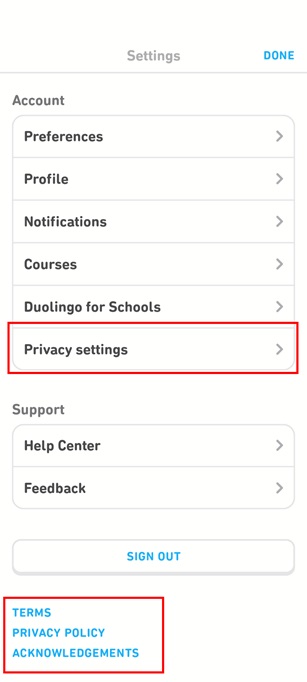
Finally, you'll usually need to display a link to your Privacy Policy also within the app store, such as the Google Play Store.
You can see an example of this here for Block Blast:
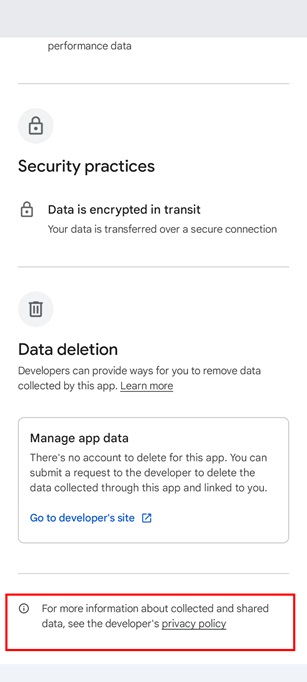
This link, and information about your privacy practices, is required for apps to be listed on these store platforms, as noted above. You just need to provide a link to your Privacy Policy when you submit your app to the app store, and the app store will display it in their own way.
Now let's take a look at a couple of other legal agreements you'll need for your mobile game, the Terms and Conditions and the EULA.
Terms and Conditions for Mobile Games
A Terms and Conditions agreement is a contract between you and the users of your mobile game. For mobile games, this type of document would explain, for instance, the ways that users should play your game, how they should interact with other users, if they can, and any payment terms if applicable.
Terms and Conditions are also sometimes called:
- Terms of Use
- Terms of Service
- Terms
Sometimes the Terms and Conditions also contain clauses that could go in your EULA.
In this section, we'll go through:
- Why you need Terms and Conditions for a mobile game
- What you need to include in your Terms and Conditions
- How to display your Terms and Conditions
Why Do You Need Terms and Conditions for Mobile Games?
A Terms and Conditions agreement is not legally required, but is rather something that protects you from liability, and can help your users to use your game in a positive, safe way.
Having one is a must because your Terms and Conditions explains the rules, rights, responsibilities and obligations for both you and your users.
If your mobile game costs money, or has in-app purchases, or allows user-generated content, Terms and Conditions are particularly important.
What to Include in Terms and Conditions for Mobile Games
Your Terms and Conditions should include information on fees or payment terms, user content, any limits on liability, how disputes are handled, how the game should be used (e.g. conduct rules), and how the Terms and Conditions will be updated.
Here's a couple of examples showing terms that you'll need that are specific to games.
The example below is from Supercell, the makers of games like Brawl Stars, showing limitations on the use of the game. This includes, for example, that users are not allowed to cheat during the game, or use exploits, automated software, or bots. They are also not allowed to modify the files of the game, i.e. hack the game in any way:
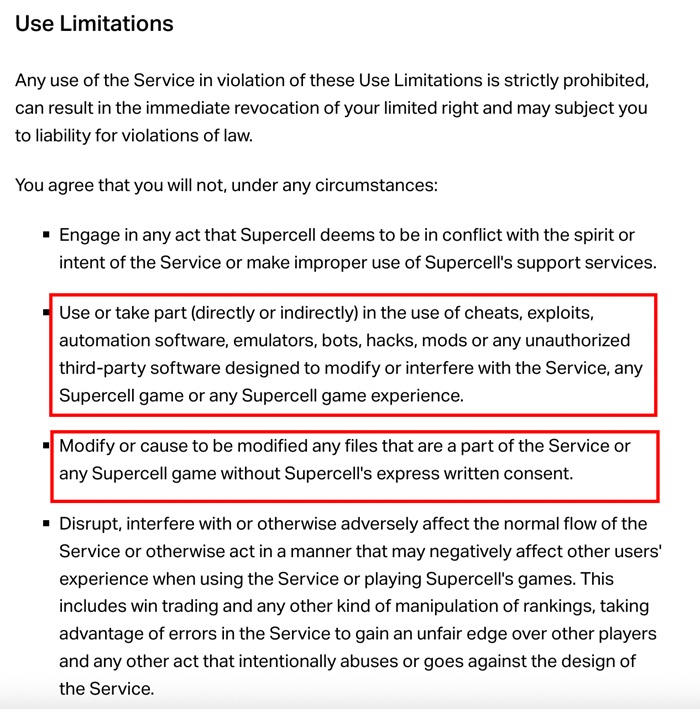
Here's another example from Flappy Bird's Terms of Service, with its clause on user-generated content:

Here's another example from Dragon Quest of the Stars, a game by SquareEnix. The game allows users to spend virtual currency within the game:

This clause discusses how virtual currency can be purchased, how the price of virtual currency can be changed, and who is responsible for the taxes on the purchase.
Here's another example from Playtika, who make games like Bingo Blitz, explaining how payment works when coordinated through the Google Play Store or the Apple App Store:
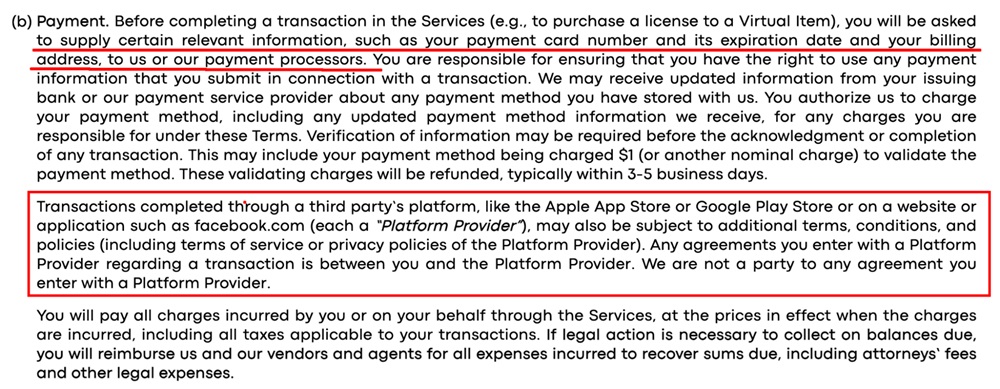
If your game costs money or allows in-game purchases of virtual items or currency, make sure you include similar clauses in your Terms and Conditions.
How to Display Terms and Conditions for Mobile Games
Like the Privacy Policy, you should display your Terms and Conditions in the main website footer for your game, as well as within the game itself, such as in a settings menu.
Here's an example of how you should display your Terms and Conditions in your main website footer, like the website of the game Among Us:
![]()
You'll also need to display your Terms and Conditions in a menu accessible from within your mobile game.
Here's an example of how the Terms and Conditions (here called "Terms of Service") is displayed in the settings menu for the game Subway Surfers:
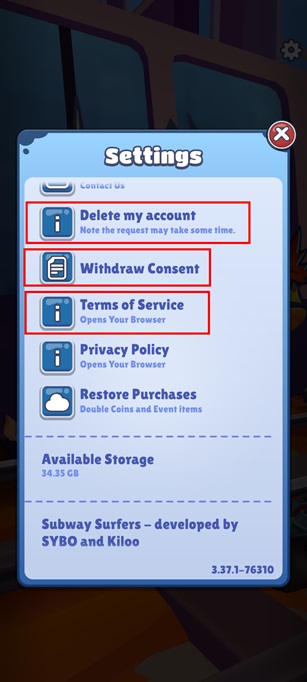
Note that it also includes easy-to-find and clear links to delete a user account and to withdraw consent. These types of links can also be useful for your Privacy Policy and privacy practices, as discussed in the section above.
You can also see that it clearly explains that clicking on the Terms of Service link will take the user to a browser to view those Terms. This is good practice for helping your users to understand what is happening through the interface.
Like the Privacy Policy, you can also display a pop-up within your app to show your users your Terms and Conditions. This is best practice, along with an "Accept" button, like the examples from Block Blast and Candy Crush above.
Now let's take a look at an EULA.
EULA for Mobile Games
An End User License Agreement (EULA) is an agreement that grants users a license to use your mobile app, with certain limitations and restrictions. The license grant, as well as the limitations and restrictions will be outlined in the EULA.
In this section, we'll go through:
- Why you need an EULA for a mobile game
- What you need to include in your EULA
- How to display your EULA
Why Do You Need an EULA for Mobile Games?
An EULA is a legal agreement that tells your users their rights and rules around how they can use your mobile game. For a mobile game, an EULA is normally not necessary, but can be an extra layer of protection for you. This is particularly relevant if you have a subscription model, although this is uncommon for mobile games.
Compared to a Terms and Conditions, an EULA is normally a more focused, shorter document focusing on copyright, licensing, and appropriate uses of the software.
What to Include in an EULA for Mobile Games
An EULA for mobile games includes clauses on licensing, as well as on appropriate conduct, in-app purchases, and user-generated content. In some cases, you will see Terms and Conditions that include these clauses as well.
Here's one example of a licensing clause from the Talking Tom game's EULA:
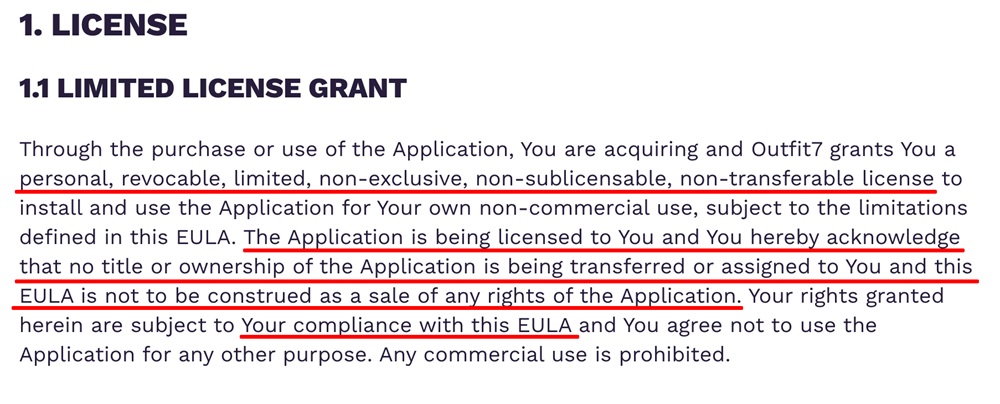
You can see that it establishes what kind of license the user has (personal, revocable, limited, non-exclusive, non-sublicensable, and non-transferable). It also states that the game is licensed to the user, and ownership has not been transferred.
Here's another example of a clause from the PUBG mobile game EULA, covering user behavior:
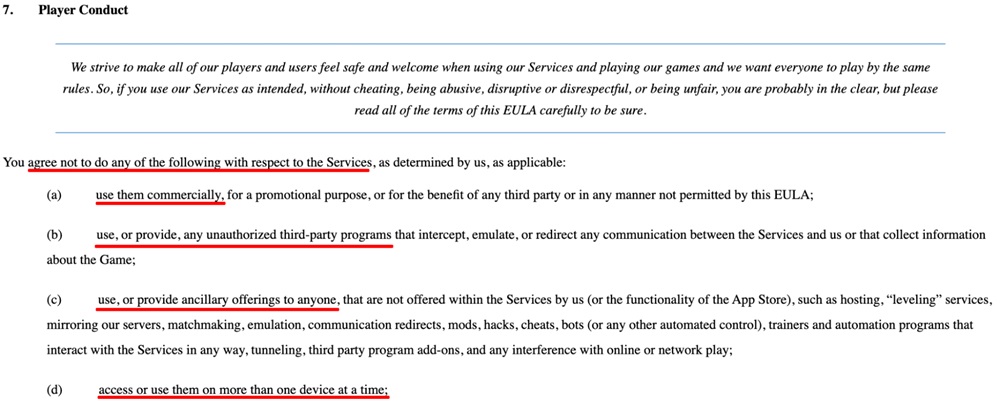
You can see that the clause contains a clear list of prohibited behavior (and more not included in this image), such as no commercial use, not using third-party programs inside the game, not offering other services to other players, and not using the game on more than one device simultaneously.
Other clauses might include rules about downloading the app, access through the relevant app store, user content, any limitations on liability, rules around in-app purchases, third-party content, and warranties for use.
How to Display an EULA for Mobile Games
Like your Privacy Policy and Terms and Conditions, you'll need to display your EULA within your website and also within the game itself. Ideally, the EULA would pop up at the beginning of a user's engagement with the game.
You can see in the images below how the EULA is displayed for the game My Talking Tom 2. First, a user would tap on the Legal menu:
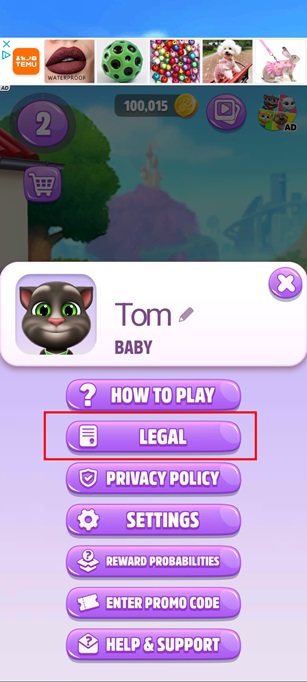
After tapping on it, you have access to the EULA, another link to the Privacy Policy, and a country-selection menu so that any documents will be fitting for your location:
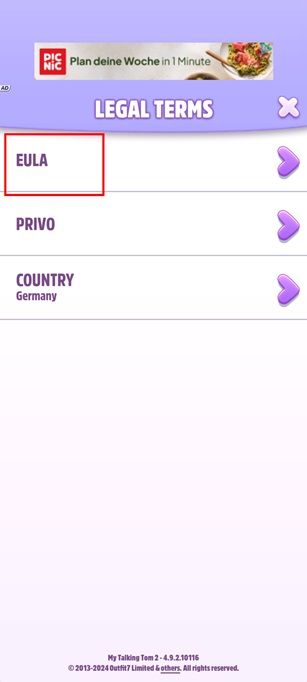
Here's an example from Farmville 3's website, where a link to the EULA is displayed at the bottom of the page:

Summary
Having a Privacy Policy, Terms and Conditions, and an EULA will make sure that you are both meeting your legal obligations, and are protecting yourself from risk.
A Privacy Policy enables you to comply with laws such as the GDPR, CalOPPA or DPA, depending on your jurisdiction.
Your Terms and Conditions and EULA set out clear agreements between you and your users to establish rules and regulations for using your mobile game, any obligations that each of you have, and any licensing or payment arrangements.
With these three legal policies, your game will be legally ready to go.

Comprehensive compliance starts with a Privacy Policy.
Comply with the law with our agreements, policies, and consent banners. Everything is included.
